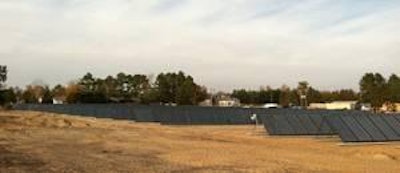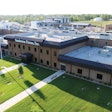
FLS Energy is constructing a solar thermal farm with a seven-acre footprint and 2,100 ground-mounted flat-plate solar panels at the site of the Prestage Foods turkey slaughter and packing facility in St. Pauls, N.C. The solar system is expected to provide the energy needed to heat around 100,000 gallons of hot water per day.
Construction of this $10-million solar project should be complete in March. Prestage Foods has made no capital investment in the development of the solar thermal farm, and the company will be charged only for the British thermal units of heat transferred to the plant’s water. Brownie Newman, vice president and director of project finance, FLS Energy, would not disclose the rate charged for heating the water, but he said it was around half the cost of heating the water with propane. Mike Pope, controller, Prestage Foods, said the fee charged by FLS Energy was slightly less than what heating the water with natural gas would cost.
The St. Pauls plant has been using propane-fired boilers to meet its hot water needs. Pope explained that the closest natural gas line ends a few miles away from the plant. Extending the line would have offered the plant a cheaper fuel cost per BTU than burning propane, but the gas company wanted Prestage Foods to pay the cost of extending the pipeline. FLS Energy offered to heat the hot water for less without any investment by Prestage Foods.
Pay as you go
A major drawback of many alternative energy projects is that they put the consumer of energy into the energy generation business. In its three thermal solar projects in North Carolina, FLS Energy serves as a supplier of energy. In the same way an electric utility provides kilowatt hours of electricity to its customer, FLS Energy will provide BTUs of heat to its clients in the projects.
In addition to the Prestage Foods project, FLS Energy has thermal solar projects with a North Carolina textile company and the Marine Corps base at Camp Lejeune.
How it works
The objective for the solar system is to convert as much solar energy into heat as possible, store the heat energy and then transfer it to water used in the plant sanitation process. A glycol-and-water mixture is circulated through the solar collecting panels to be heated. Solar radiation can heat the fluid in the panels to as much as 180F. After heating, this fluid is pumped to heat exchangers where heat is transferred to water that is stored in one of 10 insulated storage tanks.
Water from the storage tanks is pumped to another set of heat exchangers that are used to transfer heat to water in the processing plant. A system will be employed to measure incoming and outgoing water temperatures and flow rates so that the number of BTUs of heat provided for the plants use can be calculated.
Plant water will be heated as much as possible in the heat exchangers. After heating, the hot water can be mixed with unheated water to adjust the water to the proper temperature for its desired use.
The plant currently consumes around a half million gallons of propane per year for all uses, and around 320,000 gallons are used to heat water for sanitation. It is expected that the heat energy provided by the solar system will reduce propane use by around 250,000 gallons per year.
Solar energy alternatives
While photovoltaic technology has improved over the last few years, thermal solar systems are still more efficient at converting solar energy into usable energy. With today’s technology, thermal solar systems are around twice as efficient as photovoltaic systems.
The Prestage Foods solar thermal farm will be one of the most significant solar projects developed in the nation for use of onsite solar thermal energy, according to Newman. State and federal government inducements for renewable energy projects play a role in the economics of the system.


















